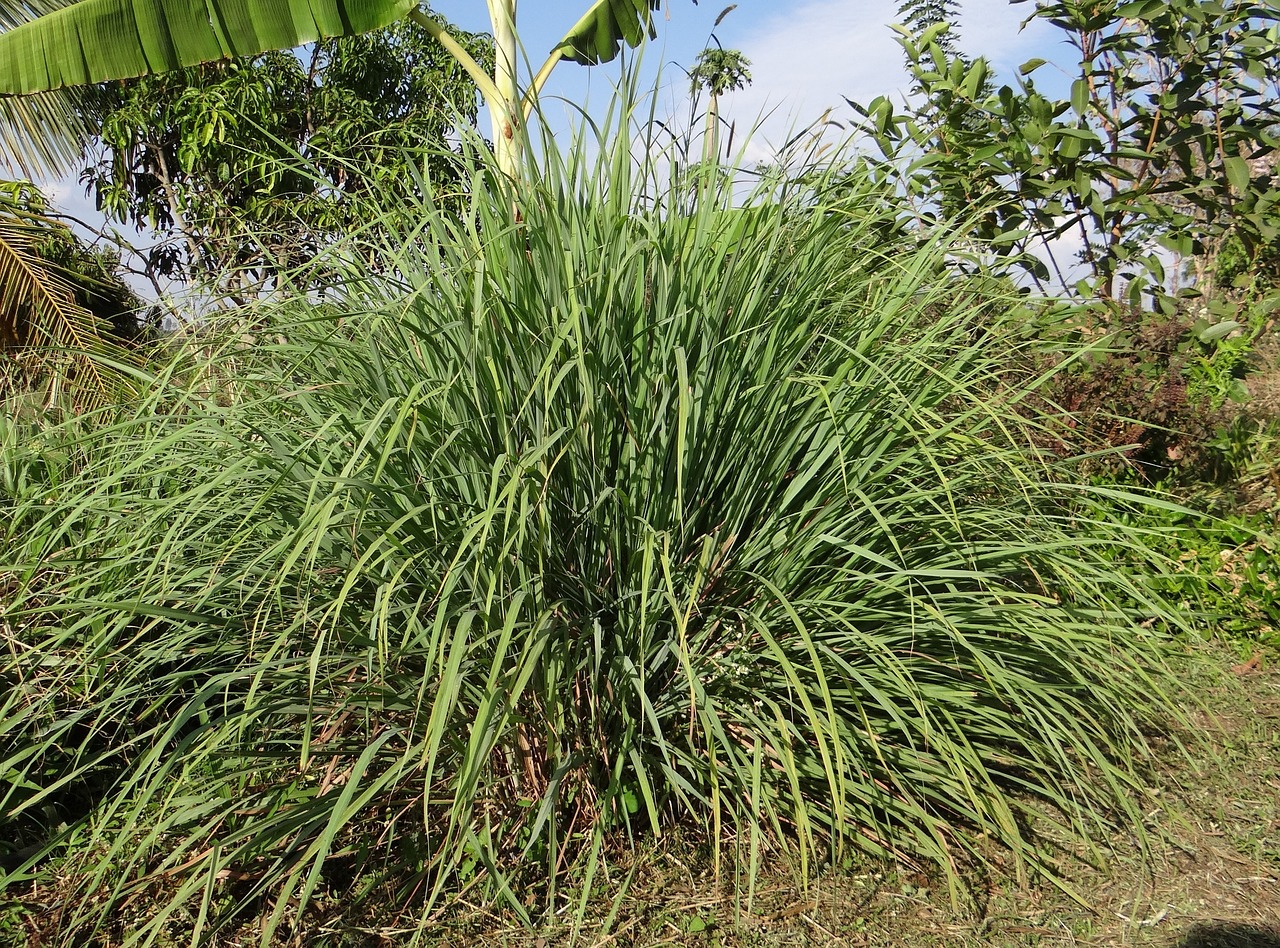Lemongrass
Overview
Cymbopogon citratus, known as lemongrass, is a perennial herb with a rich lemon-scented aroma, native to regions in Asia, Africa, and Australia. Celebrated for its culinary and medicinal values, lemongrass is used widely in cooking for its zesty flavor and in traditional medicine for its presumed health benefits, including anti-inflammatory and digestive properties. However, its application as a smoking herb is not well-documented, and its consumption is typically enjoyed in teas or dishes.
Common name(s): Citronella grass, barbed wire grass, silky heads, fever grass, tanglad, hierba Luisa
Scientific name: Cymbopogon citratus (DC.) Stapf

Characteristics
Known for its lemony aroma, culinary versatility, and potential medicinal properties.
Region
Native to Asian, African, Australian, and tropical island regions.
Natural Habitat
Lemongrass typically grows in tropical and subtropical regions, often in open fields and grasslands.
Cultivation
Thrives in full sun, requires regular watering but well-drained soil, and prefers loamy or fertile soil with a pH between 6.5 and 7.5.
Traditional Usage
Lemongrass has been cherished for centuries in various cultures for its refreshing scent and diverse applications. It’s not only a kitchen favourite but also holds a valued place in traditional medicine. Here are some of the ways in which lemongrass has traditionally been used:
- A culinary herb, particularly in Asian cuisine, to impart a citrusy flavor to dishes such as teas and soups.
- In traditional medicine, it’s lauded for its digestive benefits, helping to soothe the stomach.
- Its aromatic properties have made it popular for its calming effects, often used to alleviate cold symptoms and headaches.
- Known for its anti-inflammatory and fever-reducing properties, providing a natural remedy for various ailments.
While lemongrass is generally not recognized for smoking, it continues to be a staple for its therapeutic benefits and distinct lemony fragrance, making it a versatile herb for home use.
Historical Usage
Used for centuries in traditional medicine and cooking, particularly in Asian cuisine for its citrus flavor and digestive benefits.
Common Usage
Commonly used in cooking for its citrus flavor, in teas for digestive health, and medicinally for anti-inflammatory and antimicrobial properties.
Effects
Lemongrass is celebrated for its alluring fragrance and is utilized extensively for its potential medicinal qualities. This herb has made a significant mark in both culinary and wellness circles. Here’s how it usually benefits those who incorporate it into their routines:
- Rich with antioxidant properties, lemongrass aids in warding off oxidative stress and supporting the body’s natural defense mechanisms.
- Its antimicrobial attributes are noteworthy, contributing to the protection against certain bacteria and fungi.
- Known for assisting in digestion, it often settles the stomach and improves digestive function.
- The herb has properties that may help in managing high blood pressure, enhancing cardiovascular health.
- It showcases anti-inflammatory abilities that have been traditionally tapped to reduce fever and alleviate common cold symptoms.
- Lemongrass’s calming effect is also associated with easing headaches and contributing to a sense of well-being.
These general effects point to lemongrass as a versatile and wholesome herb well-suited for those seeking natural ways to enrich their health and culinary experiences. However, it’s important to use it mindfully as excessive consumption might lead to unwanted side effects. Always consider consulting a healthcare provider before making it a regular part of your diet, particularly if you are pregnant or breastfeeding3.

Lemongrass: Boasting antioxidant and antimicrobial effects, this versatile herb supports digestion and blood pressure regulation.
Effects when smoking
Smoking lemongrass is not a common practice, partly because the specific effects have not been thoroughly studied. However, the herb is traditionally celebrated for its lemony scent and potential health benefits when consumed in other forms, such as teas or culinary dishes. Here’s what we do know about lemongrass from other modes of consumption that might give insights into its effects when smoked:
- Lemongrass contains compounds like citral and myrcene which contribute to its unique aroma and are thought to have therapeutic properties. 3
- It may exhibit antioxidant and antimicrobial qualities that support general well-being. 3
- Consuming lemongrass has been associated with aiding digestion and managing high blood pressure. 3
- There is a belief in its anti-inflammatory and fever-reducing effects, as well as a calming impact on the stomach. 3
- People often experience a sense of refreshment and invigoration from its flavor and aroma, which translates to an enhanced mood and a feeling of well-being when used in teas and cooking. 3
However, without concrete research on the effects of smoking lemongrass, these potential benefits remain speculative for smoked forms. It’s important to approach smoking lemongrass with caution due to the lack of evidence regarding its safety and effectiveness in this context. If interested in lemongrass’s benefits, other well-established methods like brewing teas or using it as a flavor enhancer in food are recommended. Always remember, moderation is crucial, and consult with a healthcare provider before trying new herbal practices, particularly if pregnant or breastfeeding.
Flavor Profile
Strong lemony taste with earthy and slightly sweet undertones.
Edible Parts
Leaves and stem
Effects when Smoked
Specific effects of smoking are undocumented and not conventionally recognized.
User Experiences
Users often describe a feeling of refreshment and enhanced mood from the aroma and flavor of lemongrass.
Medicinal Benefits
Lemongrass is not only appreciated for its lush citrusy aroma but is also renowned for its potential medicinal benefits. As an herb with significant healing properties, it has been broadly utilized in traditional medicine for centuries. Here’s a glimpse at the benefits that have garnered attention:
- Anti-inflammatory Effects: Lemongrass may help reduce inflammation, which is beneficial for conditions such as arthritis.
- Antioxidant Properties: Its compounds may help in neutralizing free radicals, supporting overall health.
- Antimicrobial Activity: It has been suggested to combat certain strains of bacteria and fungi.
- Digestive Aid: Lemongrass can have a soothing effect on the stomach and improve digestive functions.
- Fever Reducer: Traditionally used to lower fevers, due to its cooling effect.
- Headache Relief: The herb has been used to alleviate headaches, possibly due to its calming aroma.
These potential health benefits make lemongrass a favored choice for those looking to augment their wellbeing with natural, plant-based options. However, it is essential to consult with a healthcare professional before making it a regular part of your routine, especially for special populations like pregnant or breastfeeding women.3
History and Folklore
Lemongrass has a rich history in traditional medicine and cuisine, particularly within Asian cultures. Its aromatic properties have been harnessed for adding a citrusy zest to food, including teas and soups, lending both flavor and digestive benefits. Beyond its place in the kitchen, lemongrass has been valued for its supposed medicinal qualities, such as reducing fever and inflammation as well as providing relief for stomach ailments, cold symptoms, and headaches1. With the rise in popularity of natural remedies in Western practices, this herb has gained more acknowledgment for its historical and therapeutic roles.

Traditional staple in Asian healing and culinary practices, lemongrass offers both soothing flavors and potential health remedies.
Side Effects and Contraindications
Certain contraindications should also be noted. As with any herb, lemongrass may interact with other medications or medical conditions. Therefore, those with pre-existing medical issues should seek medical advice prior to use to avoid any adverse effects.
Legal Status
Lemongrass is largely regarded as a legal substance around the globe. Utilized for its culinary and medicinal benefits, this herb complies with the legal standards in many regions. While there is a general permissibility for its use, it’s important to stay informed about regional regulations, since legal restrictions can vary.
To ensure full compliance, checking local laws is a best practice when using lemongrass in any capacity.
References
1. Missouri Botanical Garden. “Cymbopogon citratus – Plant Finder”, https://www.missouribotanicalgarden.org/PlantFinder/PlantFinderDetails.aspx?kempercode=a504
2. CABI Compendium. “Cymbopogon citratus (lemongrass)”, https://www.cabidigitallibrary.org/doi/10.1079/cabicompendium.17377
3. Wikipedia. “Cymbopogon”, https://en.wikipedia.org/wiki/Cymbopogon
Image Credit: sarangib
Image Credit: phuonghoangthuy
Image Credit: daniel64
Nicolas Duval
Nicolas is a passionate advocate for nature and the art of wildcrafting. His dedication shines through in Wildcraftia, a website he meticulously crafted to serve as a haven for nature enthusiasts worldwide. Driven by a deep appreciation for nature’s connection to humanity, Nicolas embarked on his journey in 2011 with SmokableHerbs, a platform showcasing his love for nature’s bounty. Building upon this foundation, he established Smokably, a thriving online store offering premium herbs and blends to a global audience.
